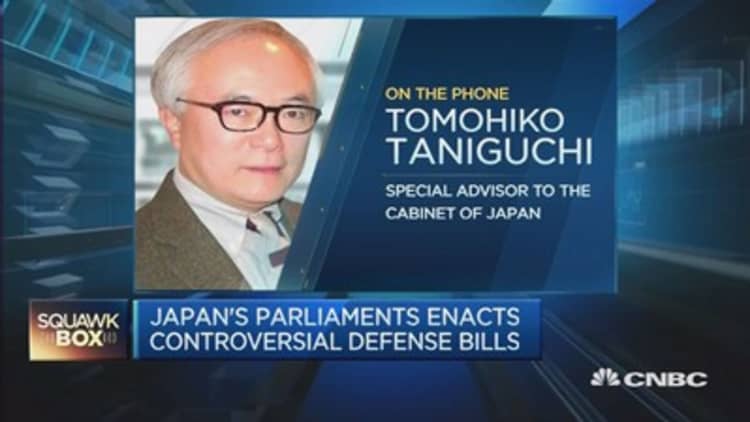Japanese Prime Minister Shinzo Abe is refocusing his attention back on the economy with an ambitious gross domestic product (GDP) target and three fresh "arrows" in what is being dubbed by some as "Abenomics 2.0", but is this another case of over-promising and under-delivering?
Abe, who won a rare second term in the otherwise revolving door world of Japanese politics as the head of the ruling Liberal Democratic Party earlier this month, pledged on Thursday to raise GDP by nearly a quarter to 600 trillion yen ($5 trillion). He also unveiled three new goals for Abenomics : strong economic growth, assistance for child rearing to lift low birth rates, and social security measures to increase nursing facilities for the aged.
Abenomics is the term widely used to describe Abe's approach to reflate the economy, which was originally based on three pillars: monetary easing, fiscal expansion and structural reforms.
Abe's announcement comes as the economy continues to struggle with sluggish domestic demand and falling inflation. Japan's main inflation gauge – the core consumer price index (CPI) – dipped 0.1 percent on year in August – slipping further away from the Bank of Japan's 2 percent inflation target. It was the first year-on-year decline since April 2013, when the Bank of Japan launched its unprecedented asset-buying program.
The economy contracted in the three months through June and earlier this month, Standard & Poor's cut Japan's credit rating to AA- from A+.

"Very few people will take the 600 trillion yen GDP goal very seriously. It's just politician's talk. In an overall shrinking society, this is clearly not achievable," Martin Schulz, a senior research fellow at Fujitsu Research Institute told CNBC.
Japan is grappling dual demographic headwinds of a rapidly ageing population and declining birth rates, posing a major challenge for the world's third largest economy. The country's native population fell by 271,058 to 126.16 million in 2014, the biggest drop on record and the sixth straight year of decline, according to the internal affairs ministry.
Nevertheless, Schulz gave a thumbs up to Abe's new arrows, which he regards as more realistic goals that will make a difference to Japanese society.
"While they may not sparkle investors' imaginations by most standards, they are realistic in terms of what's needed, and are more future-oriented compared with previously outlined structural reforms goals around energy, agriculture and trade," he said.
A lack of enthusiasm among investors was reflected in the performance of the benchmark Nikkei 225 index, which opened down 2.7 percent on Friday, before paring some losses to trade 0.3 percent lower.
Read More Japan's Q2 GDP revised up but pressure on Abe, BoJ remains
"There was not necessarily anything original in this announcement," said Masaki Kuwahara and Tomo Kinoshita, economists at Nomura.
"Support for child rearing and social security are both important policies, but their elevation into the second and third arrows comes somewhat out of the blue. It looks as though the government may have attempted to come up with policies to boost its flagging rating in addition to giving fresh impetus to initiatives that have gone slightly sideways, for example social advances for women, one of the flagship policies for Abenomics," they said.
While most agree, Abe's new policy framework is no game-changer, Jesper Koll, CEO of exchange traded funds provider WisdomTree, believes the Prime Minister may be laying the groundwork for further measures to support the floundering economy.
"He's acknowledging that the domestic economy has been weaker than expected, and not blaming external conditions. That's very important," Koll told CNBC.
Koll expects Abe's plan of action will proceed as follows. "The Prime Minister is heading to New York next week, where he will likely make several public speeches on the economy. Then we are likely to get a reshuffle of the cabinet," he said.
Following this, the Bank of Japan is scheduled to hold a monetary policy meeting on October 30, when an expansion of stimulus could be announced. If the central bank holds fire in October, an announcement in November is still a possibility, Koll said.
Simultaneously, Japanese parliament will likely announce a supplementary budget to bolster the economy, he said.
"We'll see a 'one dream, one team' approach involving the Bank of Japan, ministry of finance and cabinet office."


